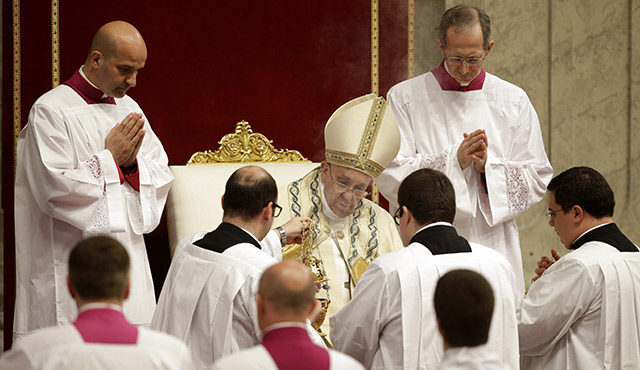On the Second Sunday of Easter Pope Francis solemnly announced the plans for an Extraordinary Holy Year that will begin on Dec. 8 of this year and continue until the Solemnity of Christ the King in 2016. Dec. 8 was chosen as the solemn beginning of this Holy Year since it will mark the 50th Anniversary of the close of the great Second Vatican Council, the watershed moment in the history of our Church in the 20th century. The focus of this Year of Grace and Blessing will be on God’s unfailing mercy to his people.
The notion of a “jubilee” year is rooted in the Hebrew Scriptures that celebrated an outpouring of God’s mercy and forgiveness in a special way every 50 years, as reflected in the Book of Leviticus (25:8-13). In these special years, “slaves and prisoners would be freed, debts would be forgiven and the mercies of God would be particularly manifest.”
The notion of a special jubilee year celebrating God’s forgiveness and mercy was taken over by Christians, and history records the first Christian jubilee year in 1300, called by Pope Boniface VIII. Approximately every 50 to 25 years since that time, the Church has celebrated these special “Holy Years” to mark the outpouring of God’s grace and mercy.
A pivotal aspect of a Holy Year is the encouragement of all of us to journey to the historic roots of our faith, especially a pilgrimage to the Eternal City of Rome to pray at the great churches that enshrine so vividly our heritage of faith and belief. I remember so well journeying to Rome to celebrate the Extraordinary Holy Year at the turn of the millennium in 2000. It was in the midst of this pilgrimage visit that I had the special opportunity to see and meet the now Pope St. John Paul II for the last time.
Pope Francis has called this Extraordinary Holy Year of Mercy to help all Christians remember and celebrate what is truly at the heart of the good news of Christ—the mercy and love of a faithful God.
The solemn announcement of a Holy Year came in the form of a special proclamation called a “Bull of Indiction.” The word “bull” comes from the Latin, bulla, that literally was the seal that was affixed to these official documents and proclamations. In his bull entitled, “The Face of Mercy” (Misericordiae Vultus), Pope Francis lays before us the overarching motto of the jubilee, “Merciful like the Father.” He states, “The time has come for the Church to take up the joyful call to mercy once more. It is time to return to the basics and to bear the weaknesses and struggles of our brothers and sisters. Mercy is the force that reawakens us to new life and instills in us the courage to look to the future with hope.”
Within this year of grace and blessing, the Holy Father has articulated specific elements of importance. He:
- invites Catholics to rediscover works of mercy.
- suggests that the Sacrament of Penance will be paramount.
- will appoint priests in every diocese to be “convincing preachers of mercy,” and they will forgive particularly grave sins without having to ask permission from the Vatican. For example, they will have the authority to pardon sacrilege against the Eucharist.
- call for justice and conversion, especially for gang members.
- proposes dialogue with Jews and Muslims to avoid contempt or discrimination.
- A unique aspect of every Holy Year is the granting of a plenary indulgence to those who are open to the healing mercy of our loving Father, who confess their sins with true contrition and who pray for the intentions of the Holy Father. Pope Francis beautifully explains the meaning of this indulgence:
“A jubilee also entails the granting of indulgences. This practice will acquire an even more important meaning in the Holy Year of Mercy. God’s forgiveness knows no bounds. In the death and resurrection of Jesus Christ, God makes even more evident his love and its power to destroy all human sin. Reconciliation with God is made possible through the Paschal Mystery and the mediation of the Church. Thus God is always ready to forgive, and he never tires of forgiving in ways that are continually new and surprising. Nevertheless, all of us know well the experience of sin. We know that we are called to perfection (cf. Mt 5:48), yet we feel the heavy burden of sin. Though we feel the transforming power of grace, we also feel the effects of sin typical of our fallen state. Despite being forgiven, the conflicting consequences of our sins remain. In the Sacrament of Reconciliation, God forgives our sins, which he truly blots out; and yet sin leaves a negative effect on the way we think and act. But the mercy of God is stronger than even this. It becomes indulgence on the part of the Father who, through the Bride of Christ, his Church, reaches the pardoned sinner and frees him from every residue left by the consequences of sin, enabling him to act with charity, to grow in love rather than to fall back into sin.
As this graced moment, open for us as followers of the Risen Savior, we must never forget that in the love of Christ we are never ultimately defined by our failures, but rather by the astonishing and renewing fact that God loves us and continues to renew us, despite our failings and sins, by the grace and mercy of his Son.
That, my friends, is indeed Good News!

